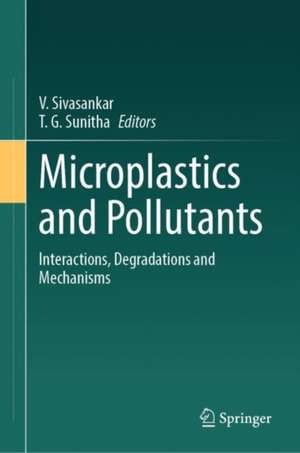Microplastics and Pollutants: Interactions, Degradations and Mechanisms
Editat de V. Sivasankar, T. G. Sunithaen Limba Engleză Hardback – 24 apr 2024
Preț: 900.18 lei
Preț vechi: 1097.78 lei
-18% Nou
Puncte Express: 1350
Preț estimativ în valută:
172.27€ • 178.76$ • 143.99£
172.27€ • 178.76$ • 143.99£
Carte disponibilă
Livrare economică 22 februarie-08 martie
Preluare comenzi: 021 569.72.76
Specificații
ISBN-13: 9783031545641
ISBN-10: 3031545648
Pagini: 324
Ilustrații: X, 324 p. 105 illus., 53 illus. in color.
Dimensiuni: 155 x 235 mm
Greutate: 0.71 kg
Ediția:2024
Editura: Springer Nature Switzerland
Colecția Springer
Locul publicării:Cham, Switzerland
ISBN-10: 3031545648
Pagini: 324
Ilustrații: X, 324 p. 105 illus., 53 illus. in color.
Dimensiuni: 155 x 235 mm
Greutate: 0.71 kg
Ediția:2024
Editura: Springer Nature Switzerland
Colecția Springer
Locul publicării:Cham, Switzerland
Cuprins
1-Microplastics degradation: Macro to Nano scale.- 2-The adsorptive profile of MPs with pharmaceutical compounds.- 3-The adsorptive profile of MPs with textile dyes.- 4-Interaction and adsorption of heavy metal pollutants with microplastics: Causes and consequences in aquatic systems.- 5-Marine MPs and their interactions with living systems: Causes and consequences.- 6-Microalgal interactions with MPs: Merits and demerits.- 7-Qualitative characterization of microplastic and nanoplastics interactions with inorganic and organic pollutants using FTIR, FESEM, Raman and TGA techniques.- 8-The quantitative analysis of monomers and additives in polymers using Pyrolysis GC-ToF-MS technique.- 9-Biotechnological methods for the abatement of microplastics from soil and water systems.- 10-A Sustainable Approach to Reduce Environmental Threats of Microplastics and future research needs.
Notă biografică
Dr. V. Sivasankar is an Assistant Professor in the Post Graduate and Research Department of Chemistry at Pachaiyappa’s College (affiliated to University of Madras), Chennai, India since 2014. He received his doctorate in Chemistry in 2009 from Bharathidasan University at Tiruchirappalli, India. He is a JSPS Post-Doctoral Fellow in 2016 from Nagasaki University in Nagasaki, Japan. His research areas include materials synthesis, microplastics, wastewater treatment and microbial fuel cells. To his credit, he has more than 90 research articles in Peer – Reviewed journals and seven book chapters in renowned publishers. He edited books on Surface Modified Carbons as Scavengers of Fluoride from Water (2016), Microbial Fuel Cell Technology for Bio-electricity (2018) and Organic Pollutants – Toxicity and Solutions (2021), Green Chemical Analysis and Sample Preparations: Procedures, Instrumentation, Data Metrics and Sustainability (2023) with Springer. He collaborates and performs research with professors in universities and research laboratories in Algeria, Brazil, France, Japan, Iran and South Africa.
Dr. T. G. Sunitha is an Assistant Professor in the Department of Chemistry at Pachaiyappa’s College (affiliated to University of Madras), Chennai, India. She was awarded the doctorate degree in Chemistry in 2009 from Anna University in Chennai, India. She is interested in the research areas of wastewater treatment, microplastics and catalytic degradation of polymers. She has more than 25 international publications in the form of journal articles and book chapters and also an edited book on Organic Pollutants – Toxicity and Solutions (2021) to her account.
Textul de pe ultima copertă
This volume discusses the adsorptive profiles of microplastic (MP) pollutants, covering their structural identity, sorption ability and degradation due to photolytic, hydrolytic, mechanical, and other environmental factors. In addition to the quantitation of (MPs) in the environment, the book unveils the deleterious effects on aquatic species and humans due to adsorbed inorganic/organic contaminants on the surface of MPs. The present book finds its uniqueness by presenting in-depth discussions on the interactions and mechanisms of microplastics with organic pollutants, microalgae, and human systems. The interactions and mechanisms between microplastics and microalgae are explored to understand the possible remediation pathways in microplastic contaminated water resources. Students and researchers in the fields of environmental science and engineering, biotechnology, aquaculture, marine technology, and water chemistry can benefit from this book. Furthermore, industries, NGOs and stakeholders dealing with wastewater, solid waste/environmental pollution will find this book useful.
Caracteristici
Discusses the adsorptive profiles of microplastic pollutants Covers the mechanisms and degradation kinetics of microplastics and the interactions with microorganisms Provides an analysis of microplastics to understand the constituent polymers and additives
